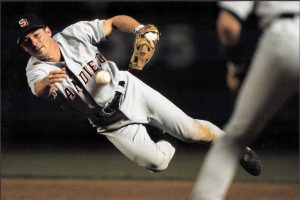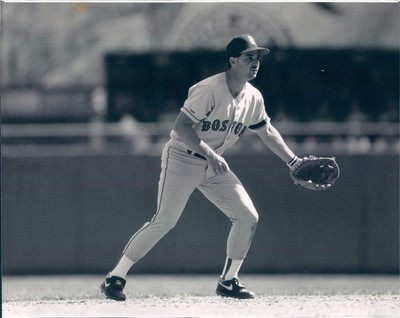Drafted by the Red Sox
The Boston Red Sox selected Jody Reed out of Florida State University in the eighth round of the 1984 draft. Reed had already been through several draft phases, but never signed. He began play immediately in A-Ball at Winter Haven. After spending all of the 1985 season at Winter Haven as well, Reed started to climb the ladder.
In 1986 he played at both AA New Britain and AAA Pawtucket. Even though he had struggled at New Britain, Reed showed his promise in Pawtucket. In 1987 he played the full season at Pawtucket before a September call-up to the big leagues. Reed had batted .296 with seven home runs in AAA, earning his way up.
In 30 Major League at-bats that September he batted .300. He got his first start in a doubleheader on September 18th and collected three hits. Batting leadoff in the game, his first hit came off lefthander Jeff Ballard of the Orioles in the fifth inning.
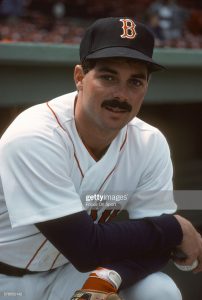
Morgan’s Magic
Jody Reed struggled to begin the 1988 season, and manager John McNamara threatened to send him down to the minors. When McNamara was fired, with the Red Sox struggling to a 43-42 record, Reed was batting .237 as a part-time player.
Instead of sending him to the minors, new manager Joe Morgan did the opposite; making him his full-time starting shortstop, replacing Spike Owen. One of the big changes Morgan made was benching his older players who were scuffling and going with the younger guys. At short, Jody Reed may have been the biggest part of that.
The Red Sox went on an epic run, dubbed “Morgan’s Magic.” The Red Sox won 12 straight to begin Morgan’s reign, and 19 of 20. They also went on to win a record 24 consecutive home games at Fenway Park. For his part, Reed batted .477 during the 12 game win streak, and .432 during those first 20 games. Getting to play every day and having the confidence of his new manager did wonders for Jody Reed.
Reed finished the season with a .293 batting average and finished third in the Rookie of the Year vote. The Red Sox won the American League East following their huge run under Joe Morgan.
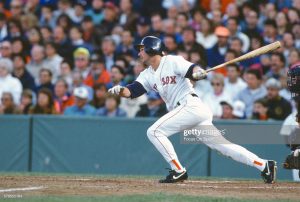
A Doubles Machine
Reed continued to start for the Red Sox over the remainder of his tenure with the team. In 1989 he split evenly between second base and shortstop, as the Red Sox lost their second baseman Marty Barrett to injury during the season and acquired shortstop Luis Rivera from the Expos.
Reed did his part, batting .288 with 42 doubles. Those doubles placed him third in the American League, as Reed started proving himself as a doubles machine in Fenway Park.
Reed mostly started at second base in 1990, but played his old shortstop position some as well. The position switching didn’t affect his ability to hit doubles, as Reed led the entire Major Leagues with 45 doubles. He batted .289 and hit a career high five home runs. Yes, he didn’t have much for home run power, but all those doubles worked just fine.
1991 saw more success from Reed, as he stayed at second base all season. He matched his five home runs from the previous season, and his 42 doubles from 1989, while batting .283. To this point in his career, Reed had batted .288 and had averaged 43 doubles over the previous three seasons.
The magic went away in 1992 though. The Red Sox mistakenly fired Joe Morgan in the offseason, bringing in Butch Hobson. The whole team’s play declined in 1992, and Reed was not immune. He batted a career low .247, and only hit 27 doubles in his final season with the Red Sox.
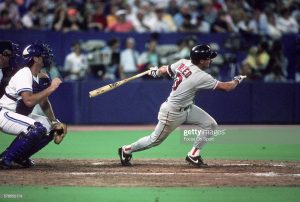
Moving On
Reed bounced around over the rest of his Major League career. He played in Los Angeles with the Dodgers in 1993, batting .276 while playing excellent defense at second base, something that would become his thing. He only made five errors, posting a .993 fielding percentage. This fielding percentage was tops in the National League at the position.
He took some flak for turning down a big contract offer from the Dodgers, and then signing for much less elsewhere in the offseason. However, it seems like he wasn’t very happy in Los Angeles, and having to team with shortstop Jose Offerman, who was a disaster at the position. Good for him for prioritizing happiness over money!
Reed played with the Brewers in 1994. He led the league with a .995 fielding percentage at second base while turning the most double plays and making the most assists at second base. Seems like he had a strong case for the Gold Glove Award. In addition, Reed batted a solid .271 for the Brewers.
Reed spent the next two years playing in the lovely weather of San Diego. In 1995 he only made four errors, compiling a .994 fielding percentage. Although he made his most errors since 1992 in ’96, he still had a nice .987 fielding percentage. Reed batted .250 in his two seasons with the Padres.
He closed out his career in 1997 by playing in 52 games with the Detroit Tigers. Reed’s play had clearly declined, as he batted under .200. Still, he had carved out a nice career for himself. He led the league in several fielding categories at second base in the second half of his career, after finishing among the league leaders in doubles during the first half of it.
